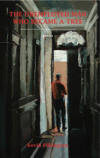The Unemployed Man Who Became a Tree
In the fall of 2004, I attended a faculty reading at Sarah Lawrence College featuring Kevin Pilkington. I can still hear Kevin’s voice tenderly describing how his niece helped him look for “poet trees,” after they drank a glass of “apple spider.” This poem, aptly titled “Apple Spider,” is from Pilkington’s 2004 collection Ready to Eat the Sky. Far from being trite and sentimental, this poem captures the magical essence of childhood innocence in a sincere narrative that exemplifies Pilkington’s ability to convey the extraordinary beauty and revelation inherent in ordinary life. His new volume, The Unemployed Man Who Became a Tree, continues to express Pilkington’s trademark emotional clarity, as is evident from the heartfelt simplicity of the last lines of “A View From Here,” in which Pilkington sits alone with his wife on a pier:
In the fall of 2004, I attended a faculty reading at Sarah Lawrence College featuring Kevin Pilkington. I can still hear Kevin’s voice tenderly describing how his niece helped him look for “poet trees,” after they drank a glass of “apple spider.” This poem, aptly titled “Apple Spider,” is from Pilkington’s 2004 collection Ready to Eat the Sky. Far from being trite and sentimental, this poem captures the magical essence of childhood innocence in a sincere narrative that exemplifies Pilkington’s ability to convey the extraordinary beauty and revelation inherent in ordinary life. His new volume, The Unemployed Man Who Became a Tree, continues to express Pilkington’s trademark emotional clarity, as is evident from the heartfelt simplicity of the last lines of “A View From Here,” in which Pilkington sits alone with his wife on a pier:
She smiles, sits
down next to me, holds onto my
right arm, looks out over the river
and sighs, then helps me the way she always
does, quietly letting her eyes fill with
everything I couldn’t possibly fit
into mine.
The last lines of this stanza have such a strikingly quiet emotional impact on me as a reader. After reading them, I know that I have just experienced a clear and true expression of love.
Though Pilkington’s poems are grounded in reality, their real energy is often conveyed through imaginative and linguistic transformations, such as that expressed by the play on the word “story” in “The Distance Between Fog and Times Square”:
Every time it stormed
raindrops hitting the glass
sounded like a typewriter
working on another story
until there was a sixth floor.
After the simple simile comparing the sound of raindrops to that of a typewriter, the poem takes a more significant leap. Suddenly this story written on the typewriter shifts its denotation and becomes the physical story of a building. The image of a typewriter building a sixth floor is not only an evocation of the power of art to impact reality, but a testament to the elasticity and diverse application of words.
This brings me to the title poem, “The Unemployed Man Who Became a Tree.” Here Pilkington reaches beyond mere wordplay or metaphor and delves fully into the transformation:
By evening I was just about done
and even began thinking like wood:
how to bud April green enough
to get spring going early this year.
By evening the fog that crawled
in on its knees was gone and there I was,
alone, holding up the moon in my branch
shaped like a right hand for the entire
city to see—smiling.
In this poem, a desperate unemployed man, answering an ad for a job as a tree, literally grows bark. Both a protest against the lack of available jobs and a celebration of the beauty of nature, this is a wonderful poem for the current economic and social climate.
Simple, direct, and honest, with striking images and evocative word-play, The Unemployed Man Who Became a Tree is a beautiful, imaginative book. One that I intend to keep in my possession. I lent out my copy of Pilkington’s 1997 collection Spare Change so many times that I have no idea who currently has it. Whoever it is was so seduced by the language and beauty of the narratives that they knew they could not part with the book. I don’t blame them. Therefore, The Unemployed Man Who Became a Tree will become a permanent part of my bookshelf. I will not again risk being bereft of such transformative magic as that displayed in the poem “Milk,” in which Charlie Parker sits in the middle of a field and takes out not a saxophone, but “a bent piece of sky the color of dawn.”




